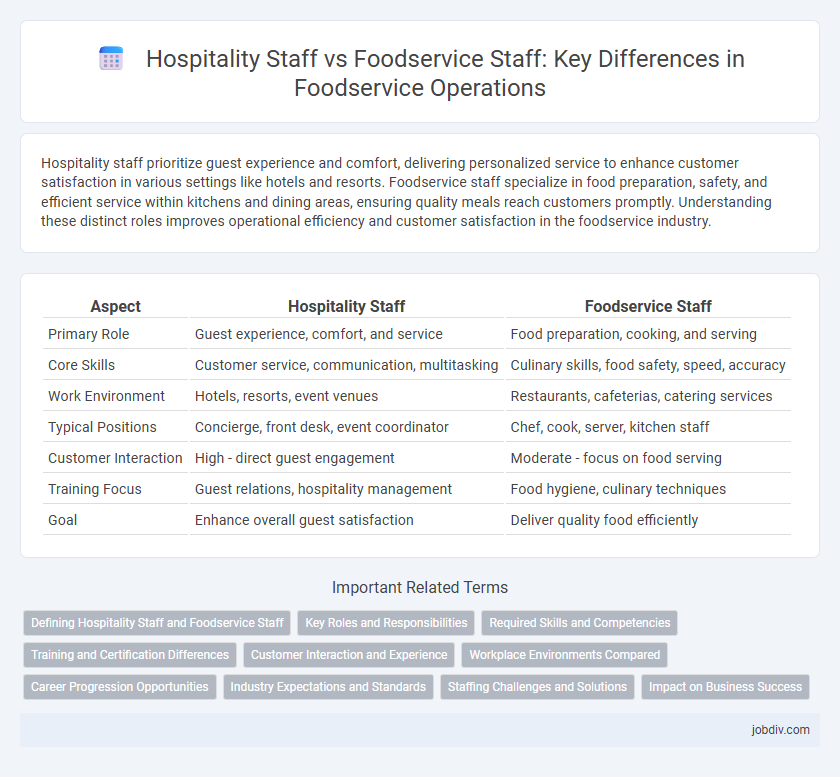Hospitality staff prioritize guest experience and comfort, delivering personalized service to enhance customer satisfaction in various settings like hotels and resorts. Foodservice staff specialize in food preparation, safety, and efficient service within kitchens and dining areas, ensuring quality meals reach customers promptly. Understanding these distinct roles improves operational efficiency and customer satisfaction in the foodservice industry.
Table of Comparison
| Aspect | Hospitality Staff | Foodservice Staff |
|---|---|---|
| Primary Role | Guest experience, comfort, and service | Food preparation, cooking, and serving |
| Core Skills | Customer service, communication, multitasking | Culinary skills, food safety, speed, accuracy |
| Work Environment | Hotels, resorts, event venues | Restaurants, cafeterias, catering services |
| Typical Positions | Concierge, front desk, event coordinator | Chef, cook, server, kitchen staff |
| Customer Interaction | High - direct guest engagement | Moderate - focus on food serving |
| Training Focus | Guest relations, hospitality management | Food hygiene, culinary techniques |
| Goal | Enhance overall guest satisfaction | Deliver quality food efficiently |
Defining Hospitality Staff and Foodservice Staff
Hospitality staff encompasses all personnel involved in creating a welcoming environment in hotels, resorts, and event venues, ensuring guest comfort and satisfaction. Foodservice staff specifically refers to individuals responsible for preparing, serving, and managing food and beverages in restaurants, cafeterias, and catering settings. Understanding these roles clarifies operational functions and improves service quality within the foodservice and broader hospitality industries.
Key Roles and Responsibilities
Hospitality staff primarily manage guest relations, ensuring exceptional service through front-of-house roles such as reception, concierge, and event coordination. Foodservice staff focus on food preparation, kitchen operations, and serving, including chefs, line cooks, and servers who maintain food safety and quality standards. Both teams collaborate to enhance the overall customer experience, balancing efficient service delivery with customer satisfaction.
Required Skills and Competencies
Hospitality staff require strong interpersonal skills, customer service expertise, and adaptability to manage guest experiences effectively. Foodservice staff must possess technical skills in food preparation, knowledge of hygiene standards, and the ability to work efficiently in fast-paced environments. Both roles demand teamwork, communication, and problem-solving abilities to ensure seamless service delivery.
Training and Certification Differences
Hospitality staff training emphasizes customer service skills, communication, and guest management to enhance overall guest experience within hotels or event venues. Foodservice staff certification focuses on food safety protocols, hygiene standards, and culinary techniques to comply with health regulations and maintain high-quality food preparation. Both roles require distinct training programs tailored to their operational responsibilities, with foodservice staff often mandated to hold certifications like ServSafe or HACCP.
Customer Interaction and Experience
Hospitality staff excel in personalized customer interaction, creating welcoming environments that enhance guest satisfaction and loyalty through attentive service. Foodservice staff focus on efficient order processing, food preparation, and timely delivery, ensuring a smooth dining experience that meets quality and speed expectations. Both roles contribute to overall customer experience, with hospitality staff emphasizing relationship building and foodservice staff prioritizing operational execution.
Workplace Environments Compared
Hospitality staff typically operate in customer-facing environments such as hotels, resorts, and event venues, emphasizing guest experience, service efficiency, and personalized attention. Foodservice staff predominantly work in kitchens, restaurants, cafeterias, and catering services, focusing on food preparation, safety standards, and timely order delivery. Both environments require strong teamwork and communication skills, but hospitality settings prioritize ambiance and guest relations, whereas foodservice emphasizes operational workflow and culinary precision.
Career Progression Opportunities
Hospitality staff typically experience career progression through roles in guest relations, event management, and hotel operations, leveraging customer service and organizational skills to advance into supervisory or management positions. Foodservice staff progress by moving from entry-level roles like servers or kitchen assistants to specialized positions such as chefs, food safety managers, or restaurant supervisors, emphasizing culinary expertise and operational efficiency. Both career paths offer growth opportunities, but hospitality careers often focus on broader guest experiences, while foodservice careers emphasize technical skills in food preparation and service management.
Industry Expectations and Standards
Hospitality staff are expected to deliver exceptional customer service, ensuring guest satisfaction through personalized interactions and attention to detail, while foodservice staff focus primarily on efficient food preparation, safety, and compliance with health regulations. Industry standards for hospitality emphasize communication skills, presentation, and guest relationship management, whereas foodservice standards prioritize hygiene, kitchen safety protocols, and speed of service. Employers demand a blend of teamwork and flexibility in both roles to meet the fast-paced, high-quality expectations of the foodservice industry.
Staffing Challenges and Solutions
Hospitality staff face challenges such as high turnover rates and demanding customer service expectations, while foodservice staff often struggle with peak-hour workload management and skill-specific training gaps. Implementing cross-training programs and leveraging workforce management software can optimize scheduling efficiency and improve staff retention across both sectors. Emphasizing effective communication and continuous professional development helps address staffing shortages and enhances overall operational performance.
Impact on Business Success
Hospitality staff drive business success by creating exceptional guest experiences, enhancing customer loyalty and positive brand reputation. Foodservice staff ensure operational efficiency and high-quality food delivery, directly influencing customer satisfaction and repeat business. Both roles synergize to optimize revenue, streamline service, and boost overall profitability in the foodservice industry.
Hospitality Staff vs Foodservice Staff Infographic

 jobdiv.com
jobdiv.com